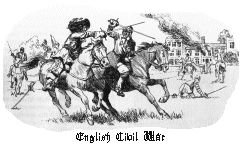Richard Lovelace & Andrew Marvell

 |
That from the nunnery Of thy chaste breast and quiet mind To war and arms I fly. True, a new mistress now I chase, Yet this inconstancy is such |
1. Who is the IInew mistress" the speaker is chasing? Why might the poet have chosen to compare this new love to his love for Lucasta? 2. What three things does the speaker "with a stronger faith embrace',? What does his loyalty to these things suggest about his values? 3. What is the inconstancy to which the speaker refers in line 9? What reason does he give Lucasta to adore "this inconstancy"? Evaluate and Connect |
Hovers within my gates, And my divine Althea brings To whisper at the grates; When I lie tangled in her hair, And fetter'd to her eye, The gods, that wanton in the air, Know no such liberty. When flowing cups run swiftly round When (like committed linnets) I Stone walls do not a prison make, |
1. Each of the first three stanzas begins with a description of an occasion associated with freedom. What are these occasions? Why do some think these occasions might make the speaker feel free? 2. In what way are the images at the end of each stanza similar? (See literary Terms Handbook, page R8.) 3. Sum up the speaker's attitude about imprisonment. What are the only freedoms the speaker claims to need? Evaluate and Connect |
This coyness, lady, were no crime. We would sit down and think which way To walk, and pass our long love's day; Thou by the Indian Ganges' side Shouldst rubies find; I by the tide Of Humber would complain. I would Love you ten years before the Flood; And you should, if you please, refuse Till the conversion of the Jews. My vegetable love should grow Vaster than empires, and more slow. An hundred years should go to praise Thine eyes, and on thy forehead gaze; Two hundred to adore each breast, But thirty thousand to the rest; An age at least to every part, And the last age should show your heart. For, lady, you deserve this state, Nor would I love at lower rate. Time's winged chariot hurrying near; And yonder all before us lie Deserts of vast eternity. Thy beauty shall no more be found, Nor, in thy marble vault, shall sound My echoing song; then worms shall try That long preserv'd virginity, And your quaint honour turn to dust, And into ashes all my lust. The grave's a fine and private place, But none I think do there embrace. Sits on thy skin like morning dew, And while thy willing soul transpires At every pore with instant fires, Now let us sport us while we may; And now, like am'rous birds of prey, Rather at once our time devour, Than languish in his slow-chapp'd power. Let us roll all our strength, and all Our sweetness, up into one ball; And tear our pleasures with rough strife Thorough the iron gates of life. Thus, though we cannot make our sun Stand still, yet we will make him run. |
1. According to the speaker, what is his sweetheart's crime? Why do you think he regards this as a crime? 2. What are some of the things the speaker claims he would do if he had unlimited time? How do these claims help the speaker's argument? 3. What image of time does the speaker present in lines 21-22? What do you think he means to suggest with this image? 4. Summarize the recommendations the speaker makes in the last stanza. How will he and his beloved make the sun "run'? Evaluate and Connect |